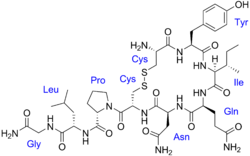If you've ever experienced butterflies in your stomach at the sight of someone or felt the sensation of being head over heels, you can blame cupid or...my favorite molecule, oxytocin - "The Love Molecule".
Oxytocin is a powerful neurohormone, neuropeptide and neurotransmitter that is produced primarily in the hypothalamus that influences behavior and physiology. It was the first hormone to have its structure sequenced and synthesized in a laboratory setting in the 1953 in France and the US.
While it's often talked about for its role in promoting social bonding, it plays a large role in female reproduction especially during and after childbirth. While this is not why it is my favorite molecule, its release during labor encourages maternal bonding, facilitates birth, and instigates lactation. Once the baby is birthed, oxytocin stimulates the maternal and nurturing instincts in the mother to her baby which aids in ensuring that the baby will be taken care of instead of being neglected. It can also encourage a nurturing aspect within males and females who are not mothers.
Oxytocin is my favorite molecule due to its role in helping to establish bonds for social relationships. There is some evidence that shows that oxytocin encourages ethnocentric behavior which incorporates the empathy of in-groups with their suspicion and rejection of outsiders. In nonsexual human relationships, it is known to increase trust, generosity, and cooperation. This molecule is essentially from where friendships originate. It is not only produced during pregnancy but also when we hug or kiss a loved one which is why it plays a major role in pair bonding. It is also stimulated during sex, birth, and breast feeding.
Other noteworthy research about oxytocin is its role in autism-spectrum disorders. While research is still fairly new, studies show that there is a link between oxytocin and feelings of trust and empathy with which is a quality that those with autism have difficulty.

I found this post very interesting. I am fascinated with brain and behavior so the evidence in this post really motivated me to read more about it. I am especially excited to learn about it's role with autism-spectrum disorder.
ReplyDeleteThis post is very interesting and informative. I liked how you broke it down to explain how it works in the brain and how it helps maternal instincts to kick in.
ReplyDelete